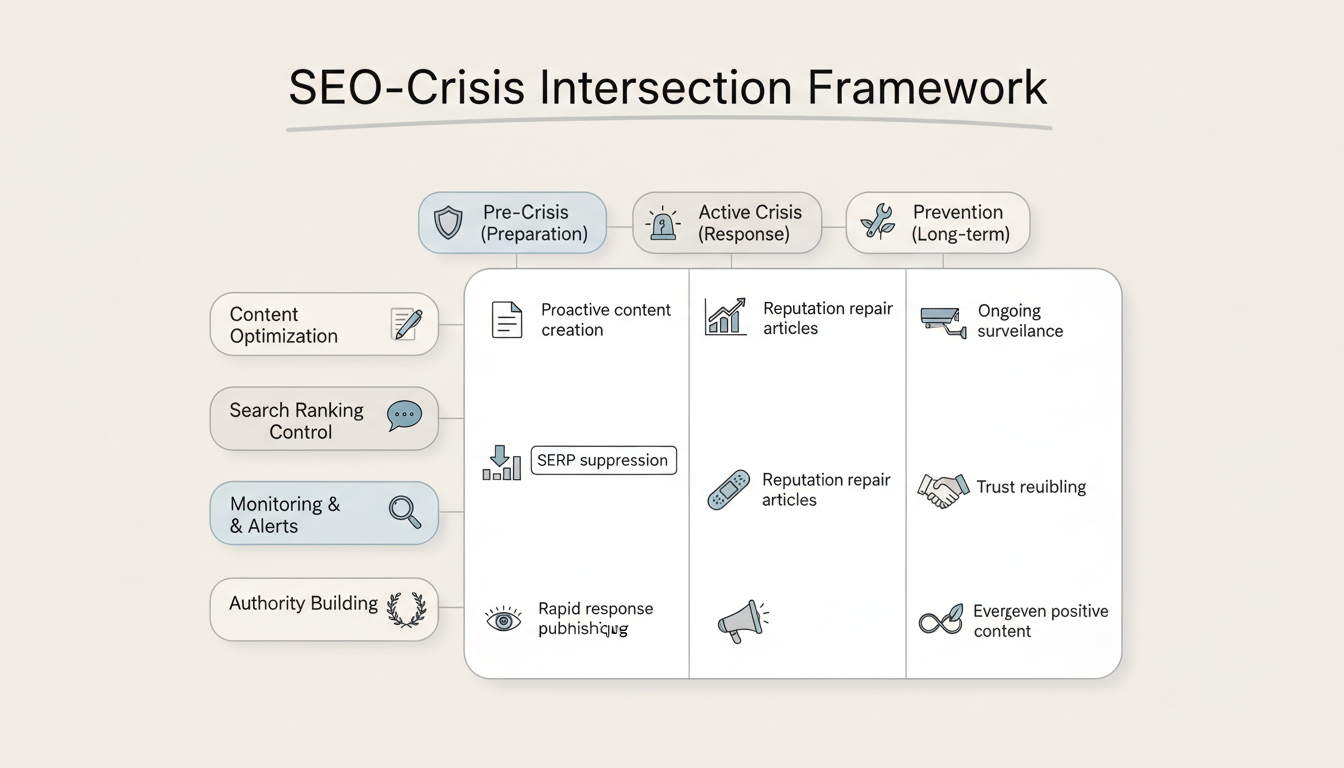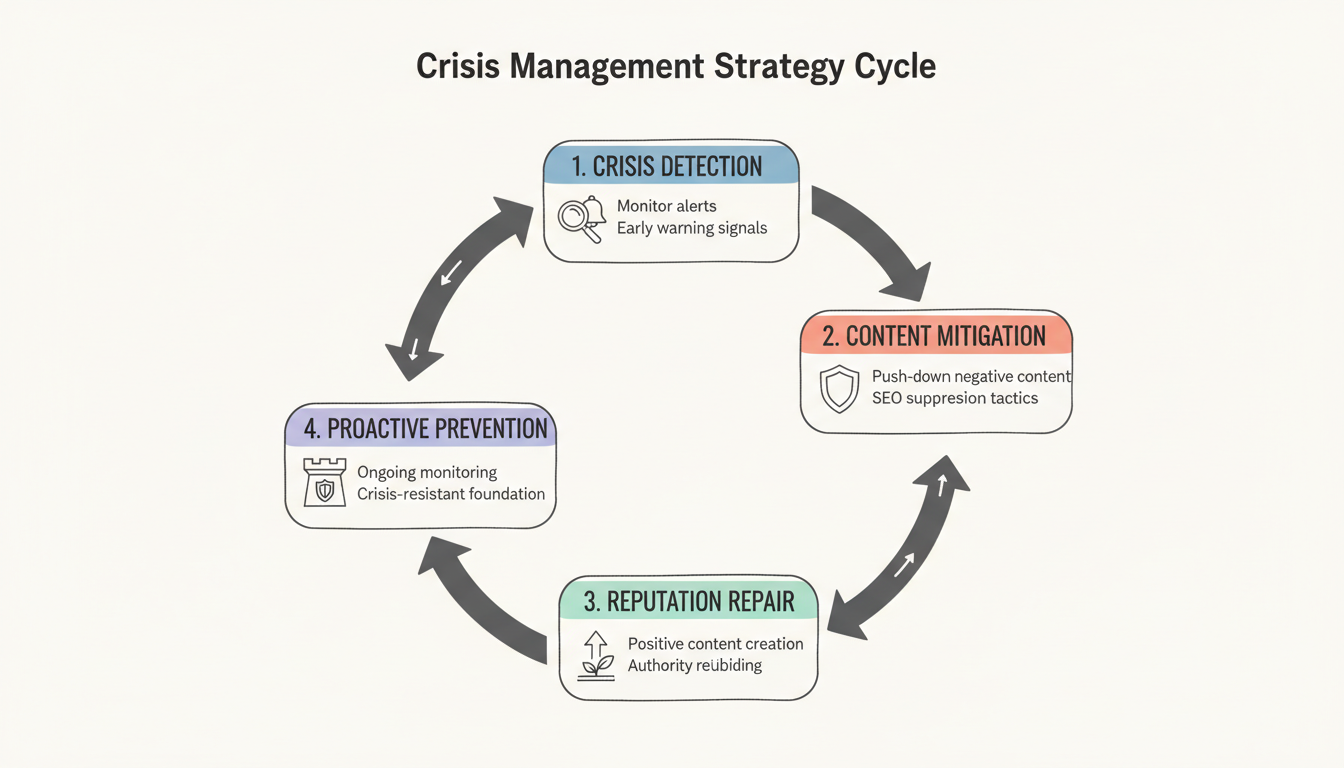In today's digital age, maintaining a positive online reputation is crucial for businesses and individuals alike. With the rise of social media and the ease of sharing information online, it has become increasingly important to be proactive in protecting and rebuilding your online reputation. One powerful tool that can be leveraged in crisis management is Search Engine Optimization (SEO). By understanding the role of SEO in crisis management and implementing effective strategies, you can mitigate the impact of negative publicity and ensure long-term reputation recovery.
SEO, or search engine optimization, plays a crucial role in crisis management by influencing how your brand or personal information is presented in search engine results. When a crisis occurs, such as a negative news article or a damaging social media post, people are likely to turn to search engines to gather information. By leveraging SEO techniques, you can ensure that accurate and positive content appears at the top of search engine results, pushing down negative content and safeguarding your reputation.
In times of crisis, the importance of SEO becomes even more apparent. It is not just about optimizing your website for better visibility; it is about controlling the narrative surrounding your brand or personal identity. By monitoring search engine results and optimizing content, you can influence how your target audience perceives your online presence, even in the face of adversity. SEO allows you to proactively manage your reputation and minimize the impact of a crisis.
At the intersection of SEO and crisis management lies a powerful opportunity to shape public perception. When a crisis strikes, it is essential to have a strategy in place that integrates SEO techniques. By doing so, you can effectively control the information that surfaces when individuals search for your brand or name.
Imagine a scenario where a negative news article about your company goes viral. Without a solid SEO strategy, that negative article could dominate the search engine results, leaving potential customers with a negative impression. However, by implementing SEO techniques, you can ensure that positive and relevant content ranks highly, effectively counteracting any negative exposure that may exist.
One way to achieve this is through the creation of high-quality, informative content that addresses the crisis head-on. By publishing articles, blog posts, or press releases that provide accurate information and present your side of the story, you can influence the narrative surrounding the crisis. These pieces of content can be optimized using SEO techniques to increase their visibility in search engine results, ensuring that your perspective is heard.

In the digital landscape, first impressions are often formed based on search engine results. When potential customers or business partners search for your brand or name, the information they find can significantly impact their perception of you. This is where SEO becomes crucial in protecting your online reputation.
By implementing SEO strategies, you can ensure that positive and relevant content ranks highly in search engine results. This means that when someone searches for your brand or name, they are more likely to come across positive news articles, glowing reviews, and informative content that showcases your expertise.
Moreover, SEO allows you to push down negative content that may exist, making it less visible to those searching for information about you. By optimizing your website, creating engaging social media profiles, and building a strong online presence, you can effectively counteract any negative exposure and safeguard your reputation.
It is important to note that SEO is not a one-time effort. In times of crisis, it becomes even more crucial to continuously monitor search engine results and adapt your SEO strategy accordingly. By staying proactive and vigilant, you can maintain a positive online reputation, even in the face of challenging circumstances.
Before delving into SEO strategies for crisis management, it is crucial to understand the signs of an online reputation crisis and the impact it can have.
Online reputation management is an essential aspect of maintaining a positive brand image in today's digital age. With the rise of social media and online review platforms, businesses are more vulnerable than ever to negative online exposure. It is imperative for companies to be proactive in identifying and addressing any signs of an online reputation crisis.
Signs of an online reputation crisis can vary, but they often include a sudden influx of negative online reviews, social media backlash, or damaging news articles. These signs should not be taken lightly, as they can quickly spiral out of control and cause significant damage to a company's reputation.
Monitoring your online presence is crucial in detecting any unusual activity that may indicate an impending crisis. This can be done through various tools and platforms that track mentions, reviews, and social media conversations about your brand. By staying alert and proactive, you can identify and respond to a crisis promptly, minimizing its impact.
Negative online exposure can have detrimental effects on your reputation and bottom line. Studies have shown that consumers are more likely to trust online reviews and social media content when making purchasing decisions. Therefore, if negative content dominates search engine results when potential customers search for your brand, it can erode trust and drive them away.
Furthermore, negative online exposure can spread rapidly through social media platforms, reaching a vast audience within minutes. This amplification effect can significantly magnify the impact of a crisis, making it even more challenging to control the narrative and salvage your brand's reputation.
Understanding the impact of negative exposure is critical for developing effective crisis management strategies. By comprehending the potential consequences, you can prioritize the implementation of proactive measures to mitigate the damage and restore trust in your brand.
In conclusion, being aware of the signs of an online reputation crisis and understanding the impact of negative online exposure is essential for businesses in today's digital landscape. By staying vigilant and proactive, you can effectively manage and navigate through any crisis that may arise, safeguarding your brand's reputation and ensuring its long-term success.
When faced with an online reputation crisis, implementing SEO strategies can help mitigate the damage and facilitate reputation repair. In today's digital age, where information spreads rapidly and can have a lasting impact, it is crucial to take proactive measures to protect and restore your brand's image.

One effective way to mitigate negative publicity is to create and optimize positive content about your brand or personal identity. By generating informative blog posts, press releases, and engaging social media content, you can regain control over the online narrative and push negative content further down in search engine results.
For example, if your brand is facing negative reviews or articles, you can counteract them by creating blog posts that highlight your company's achievements, values, and positive customer experiences. By optimizing these posts with relevant keywords and sharing them across various social media platforms, you increase their visibility and ensure they rank higher in search engine results.
Additionally, leveraging the power of press releases can be an effective strategy. Crafting well-written press releases that address the crisis, provide accurate information, and showcase your efforts to resolve the situation can help shape public perception. By optimizing these press releases with relevant keywords and distributing them through reputable news outlets, you can amplify their reach and influence.
Reputation repair requires diligent SEO techniques. This includes optimizing existing webpages, creating new content, and engaging with your audience. By optimizing meta tags, headlines, and keywords, you can ensure that search engines recognize and prioritize positive content, aiding in the recovery process.
One crucial aspect of reputation repair is optimizing your website's existing pages. By conducting a thorough audit of your website, you can identify any negative or outdated content that may harm your online reputation. Once identified, you can update and optimize these pages with relevant keywords, engaging headlines, and compelling meta descriptions to improve their visibility and search engine rankings.
In addition to optimizing existing pages, creating new content is essential for reputation repair. By regularly publishing high-quality blog posts, articles, and videos that showcase your expertise, address the crisis, and provide valuable insights, you can rebuild trust and credibility with your audience. These pieces of content can be optimized with relevant keywords and shared across various online platforms to increase their reach and impact.
Engaging with your audience is another crucial aspect of reputation repair. By actively responding to comments, reviews, and inquiries, you demonstrate your commitment to addressing concerns and resolving issues. This engagement not only helps rebuild trust but also generates positive signals that search engines consider when ranking content.
In conclusion, implementing SEO strategies for crisis management is vital in today's digital landscape. By utilizing SEO to mitigate negative publicity and employing effective techniques for reputation repair, you can take control of your online narrative and rebuild a positive brand image. Remember, consistency, transparency, and a proactive approach are key to successfully managing and recovering from an online reputation crisis.
Effective crisis management involves not only reactive measures but also proactive efforts to prevent future crises. By incorporating SEO into your crisis management plan, you can build a crisis-resilient strategy.
Integrating SEO into your crisis management plan ensures that you are prepared to address any potential online reputation threats. This includes regularly monitoring search engine results, tracking brand mentions, and staying ahead of emerging trends. By being proactive, you can identify any warning signs early on and take necessary steps to prevent a full-blown crisis.
Preventing a crisis is always better than reacting to one. Proactively managing your online reputation through continuous SEO efforts can reduce the likelihood of a reputation crisis. This includes regularly engaging with your audience, maintaining an active and positive social media presence, and building strong relationships with online influencers. By fostering positive relationships and generating valuable content, you can fortify your brand against potential reputation threats.
Even after successfully navigating a crisis, it is essential to continue monitoring and maintaining your online reputation in the long term.
SEO plays a significant role in ongoing reputation management. By consistently optimizing content and monitoring search engine results, you can ensure that your online reputation remains positive and resilient. Regularly monitoring for any potential reputation threats allows you to address issues promptly and maintain a favorable online presence.
While the immediate crisis may have passed, the impact of negative publicity can linger. By prioritizing ongoing SEO efforts, you can continue to rebuild and strengthen your online reputation. This includes continuously creating high-quality and relevant content, optimizing your website, and maintaining a positive online presence. With time and consistent effort, your brand or personal identity can recover and thrive.
In conclusion, SEO is a powerful tool in crisis management, allowing businesses and individuals to protect and rebuild their online reputation. By understanding the role of SEO in crisis management, identifying the signs of a reputation crisis, and implementing effective strategies, you can mitigate the impact of negative publicity and ensure long-term reputation recovery. By incorporating SEO into your crisis management plan and consistently monitoring and maintaining your online reputation, you can safeguard your brand or personal identity in the digital age.
By submitting this form, you agree to our Privacy Policy and Terms & Conditions.